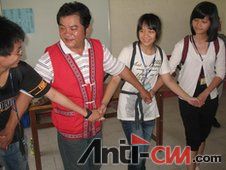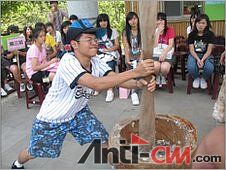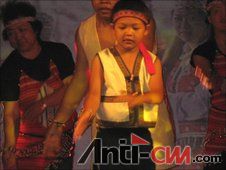|
|
本帖最后由 青蛙小王子 于 2010-7-15 14:58 编辑
Taiwan seeks to save indigenous languages
http://www.bbc.co.uk/news/10602697
14 July 2010
By Cindy Sui
BBC News, Saisiyat tribal area

The group plays Saisiyat tribal instruments strapped to their backs
Taipei secondary school student Lai Wei-li swayed awkwardly while trying to make music with a Saisiyat tribal instrument of dangling bamboo tubes strapped to her back.
"It's really cool and interesting. It's harder than it looks. I have to control my footsteps, sway my body back and forth, and co-ordinate with others," said Lai, while playing the "tapangsan".
Half Han-Chinese and half indigenous, it is not often that Lai gets to experience indigenous culture.
She can't speak the language of her tribe - the Paiwan. Her mother never learned it, and her maternal grandparents who can, live in a rural area and she only sees them twice a year.
This is the state of indigenous languages in Taiwan.
The island is considered by many anthropologists to be the source of Austronesian languages; all but one of the four primary branches are found here.
It is believed that Austronesians migrated from mainland Asia and Taiwan to South East Asia, the Pacific islands, East Timor and Madagascar thousands of years ago.
But of the world's estimated 300 million Austronesians - including New Zealand's Maoris and Hawaii's Polynesians - few can speak their language, and many languages now face extinction.
Culture eroded
In Taiwan, only about 35% of the 500,000 Austronesian indigenous people can speak their tribal language, said Chang Shin-liang, head of the language and culture department of the government's Council of Indigenous Peoples.
"We're facing a dangerous situation for indigenous languages. Seven out of 14 indigenous languages here are listed by Unesco as critically endangered," said Mr Chang.
"Many people in their 40s and 50s can't speak their mother-tongue, so they can't teach it to the younger generation. The younger people also think 'I'm fine if I can speak Mandarin and English; learning indigenous languages doesn't help me increase my competitiveness'."
The decline of the languages of the island's more than 14 tribes did not happen by accident.
The first large wave of Han Chinese to Taiwan, which started in the 17th Century, consisted of mostly men. They inter-married with indigenous people, with the Chinese culture becoming dominant.
Previous governments' oppressive policies also had destructive effects.
Under Japanese occupation (1895-1945), Taiwanese people were forced to learn and speak Japanese.
The Kuomintang party, which took power in 1945, was responsible for years of harsh suppression of native Taiwanese languages and dialects.
The Kuomintang was trying to promote Mandarin as the national language to consolidate its power, in the face of resistance over its sudden takeover of the island after it lost a civil war to China's Communist party.
"The Japanese and Kuomintang governments' combined 100-year policy of forbidding us from speaking our languages did a lot of damage. It affected three generations," said Mr Chang.
Harsh punishment
Like others of his generation, Lin Yu-cheng, 57, whose Atayal tribal name is Bon, was severely punished under Kuomintang rule when teachers caught him speaking his native language in school.
"They would beat us with bamboo sticks - sometimes until the stick broke - and with their bare hands, which left marks," said Lin, who had picked up words of the Atayal language from classmates as his parents had raised him speaking Japanese.
Teachers also made students wear wooden boards around their necks with the words "I won't speak local dialect" until the next student got in trouble; or a black button as a mark of bad behaviour until graduation day.
"This made us feel so ashamed of our language, our culture, which is something we actually should be proud of," said Lin, now director of the Saisiyat tribal community, which includes the Atayal tribe's people.
More recently, migration from tribal villages to cities, where such languages are rarely heard or spoken, has caused a further decline. About 50% of Taiwan's indigenous people live in cities.
The government has begun to make efforts to save Taiwan's indigenous languages, not only because indigenous culture is a key attraction for tourists, but there is growing recognition that it is an integral part of the island's identity.
Tribal languages are now taught in schools if there are enough students of the same tribe.
If not, children can learn at special centres that run free weekend classes; some 10,000 have already benefited. The languages have no written form, but teachers are being trained to use the Roman alphabet to make learning easier.
Future generations
Summer camps, such as the one attended by Lai in this Saisiyat tribal area in central Taiwan, are also organised. Activities here are designed to make learning fun - by mixing in ancestral worshipping rituals, lessons about medicinal plants, storytelling and music.
But some believe the government's efforts are not enough. And it is unclear whether they can undo past harm.
Some experts believe the best way to save the languages is to improve the economy in the villages where the languages are still spoken, to stem migration.
Slowly, however, there is growing interest among indigenous people and non-indigenous mainstream society in the culture. Several parents, including those who are Han Chinese, have come along to the camp, to learn alongside their children.
Bon, who is hosting Lai and 200 other students at this camp, still gets teary-eyed when he remembers being punished in school.
Despite being nearly 60, he says he also wants to take lessons.
"I want to tell the kids there's still time to learn our languages. Our mother-tongue is our mother; it's something passed down to us from our ancestors. We cannot forget it," said Bon.
At the camp, the children communicate mostly in Mandarin, but they are having a great time learning about their culture.
On arrival, Lai could only say thank you "mali mali" in her tribal dialect, but now she is singing indigenous songs.
"I hope to become fluent one day," she says. "Our culture needs to be passed to future generations."

Activities at the summer camp are designed to make learning fun

"I hope to become fluent one day - our culture needs to be passed to future generations”
Lai Wei-li
Summer camp student

Indigenous languages are being kept alive through song and dance |
BBC, indigenous, Languages, save, Taiwan, BBC, indigenous, Languages, save, Taiwan, BBC, indigenous, Languages, save, Taiwan
|